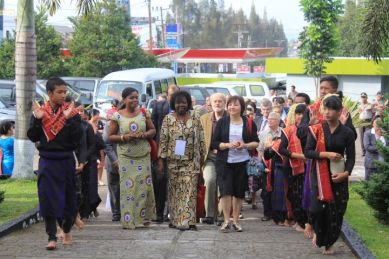As WCRC Executives Meet in Indonesia, a History of Integrating Local Culture and Christianity

As executives of the World Communion of Reformed Churches meet in Indonesia to discuss the group's plan for the coming year, they also got a lesson in Christian history as a local denomination's Pastor described some churches' favorable experiences decades ago in integrating traditional music and dances into Sunday worship.
Pastor Matius P. Barus, Moderator of the Gereja Batak Karo Protestant Church in the Karo region of North Sumatra made the comments, said such acceptance resulted in soaring membership in the region, according to a report by the WCRC. He explained that in the first 75 years of Christian presence in the area there had been few converts.
The WCRC's executive committee – composed of members from around the world - is meeting in Berastagi, North Sumatra from May 10 – 17. Among the topics on the agenda are seeing a preview of a consultation later this year for finding a Christian approach to economics in light of current structure of the world's economy, the development of Reformed identity for the communion in the coming years and reports on grants in support of church-endorsed mission and development projects.
A History of Christianity in Northern Sumatra
Barus said traditional music and dances were excluded from church service and the first missionaries from the Netherlands were viewed with suspicion as colonialists.
When the government in 1965 made it mandatory to state a religion by choosing from five officially approved religions, many of the Karonese people chose the Gereja Batak Karo Protestant Church because it was open to their traditions.
The available choices were Catholicism, Protestantism, Islam, Hinduism, and Buddhism.
Barus said that keeping a balance between traditional customs, such as burialproactices and staying faithful to the basic beliefs of the Christian faith has not always been easy.
A church manual has been created to help pastors and church elders to determine what is acceptable practice.
GBKP now has 300,000 members in 489 congregations, according to the report. In the Karo region, 30 percent. Thirty percent of Christians in the region belong to GBKP, Barus says. Another 20 percent are Muslim.
The WCRC group of more than 50 – which include executive committee members, advisors and guests from various continents – was treated to an evening of Karonese food, music and dance following Barus' presentation.
The music was played on traditional bamboo instruments and dances depicted rice planting and harvesting. The program also included a choir and a dance group from local congregations.
"It is this kind of gathering of local Christians and Christians from around the world that is at the heart of WCRC," said WCRC President Jerry Pillay.
The WCRC was formed in 2010 with the merger of the World Alliance of Reformed Churches (WARC) and the Reformed Ecumenical Council (REC). The body represents more than 80 million Reformed Christians worldwide.